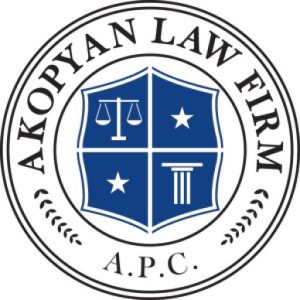Arleta Employment Lawyers
The trial attorneys of the Akopyan Law Firm A.P.C. stand ready to fight for both employers and employees in Arleta, California.
Arleta, California
 Arleta is a neighborhood of the City of Los Angeles. It is situated in the center-north section of the San Fernando Valley and is home to more than 30,000.00 Angelenos. It covers approximately three square miles, and encompasses the following zip codes: 91331, and 91224. The area of Arleta was a relatively undeveloped portion in the west of the community of Pacoima. This area remained semirural up to World War II when manufacturers expanded their operations into the valley and created more jobs. In order to accommodate factory workers, residential development increased in the area. Arleta is therefore largely residential. The Akopyan Law Firm A.P.C. is headquartered in the City of Los Angeles which is minutes away from Arleta. The Akopyan Law Firm, A.P.C. stands ready to provide legal services to both employees and employers in Arleta.
Arleta is a neighborhood of the City of Los Angeles. It is situated in the center-north section of the San Fernando Valley and is home to more than 30,000.00 Angelenos. It covers approximately three square miles, and encompasses the following zip codes: 91331, and 91224. The area of Arleta was a relatively undeveloped portion in the west of the community of Pacoima. This area remained semirural up to World War II when manufacturers expanded their operations into the valley and created more jobs. In order to accommodate factory workers, residential development increased in the area. Arleta is therefore largely residential. The Akopyan Law Firm A.P.C. is headquartered in the City of Los Angeles which is minutes away from Arleta. The Akopyan Law Firm, A.P.C. stands ready to provide legal services to both employees and employers in Arleta.
The Best Wrongful Termination Lawyer in Arleta Are Minutes Away
While Arleta thrives as a community, it is primarily recognized as a residential hub, resulting in a limited presence of lawyers or law firms within its borders. When you conduct a Google search for an “Arleta employment lawyer,” or “wrongful termintion lawyer in Arleta” the results are often populated with paid advertisements from attorneys in neighboring areas like downtown Los Angeles or Century City. This can make it challenging to identify the right attorney with the necessary expertise, as selecting solely based on paid advertisements from non-local attorneys can be a daunting task. Discovering an attorney well-versed in employment law and experienced in resolving such disputes is not as straightforward as it may initially appear. At the Akopyan Law Firm, A.P.C., each of our attorneys boasts nearly two decades of extensive experience in the field. Our legal team has consistently delivered successful outcomes for both employers and employees alike. Our firm operates on the principle of prioritizing quality over quantity. Located just a short distance from Arleta, we are ideally situated to offer residents of this community unparalleled legal representation. Whether you are an employer seeking to navigate complex employment issues or an employee facing workplace challenges, you can trust the Akopyan Law Firm, A.P.C. to provide you with the highest caliber of legal support and advocacy.
We Can Vigirously Defend Arleta Residents In Matters Involving:
Featured Article:
Losing Your Job Soon After Family Medical Leave in California: Is It Wrongful Termination?
📌 Key Takeaways Losing your job shortly after family medical leave can signal far more than bad timing. It can indicate a serious violation of your rights. Timing Matters: A termination that closely follows family medical leave often reflects deeper issues involving disability discrimination, retaliation, or hostility toward medical needs. Behavior Shifts Are Red Flags: Sudden discipline, criticism, or performance write-ups after years of acceptable work frequently signal that the employer is building a paper trail to justify termination. Comments Reveal Motives: Remarks about being “out too much,” medical appointments being inconvenient, or health conditions being a burden can expose retaliatory or discriminatory attitudes. Failure to Discuss Restrictions Is Significant: When an employer ignores medical restrictions or refuses to engage in a meaningful dialogue about them, that lack of accommodation—followed by termination—can be a major warning sign. Vague or Changing Explanations Undermine the Employer’s Story: When the reasons for termination shift or differ from how similar employees were treated, it raises serious concerns about whether protected leave or disability played a role. Wrongful termination concerns rise quickly when termination occurs after family medical leave. Southern California workers who experienced job loss after taking family medical leave will recognize early warning signs here, guiding them into the detailed overview that follows. If you are a worker in Southern California who took family medical leave because of a serious injury or medical condition—or to care for a close family member—and then lost your job soon afterward, the situation can feel overwhelming. You may be trying to balance rent, bills, and ongoing treatment while wondering whether your termination was simply harsh or whether it may be a form of wrongful termination after family medical leave. For many disabled workers and employees with qualifying medical conditions, being terminated after family medical leave does not just feel unfair. It raises questions about wrongful termination, disability discrimination, retaliation for taking protected family medical leave, and whether the termination is an adverse employment action that deserves serious legal attention. Family Medical Leave and Sudden Termination in California: A Real-World Context In California, family medical leave often involves federal and state laws such as the Family and Medical Leave Act (FMLA) and the California Family Rights Act (CFRA). These laws are intended to provide certain workers with protected family medical leave in specific situations involving serious health conditions or family caregiving responsibilities, and in some circumstances they may offer job protection. Whether a particular termination is lawful depends on which laws apply, whether the worker meets the necessary criteria, and how the employer handled the situation. Because those questions are legally complex, they require individual evaluation by an employment attorney rather than general guidance. Common Workplace Patterns When Termination Follows Family Medical Leave When losing your job soon after family medical leave in California, you may not immediately think in legal terms. What you may notice instead are changes in your employer’s behavior or treatment. Certain patterns appear frequently enough that they raise serious concerns and often... Read more









Millions of Dollars Recovered For Our Clients
Check Out Our Case Results



